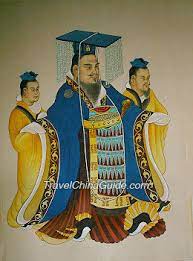Emperor Wu of Han, Han Dynasty, Chinese history, Reign of Emperor Wu, Legacy of Emperor Wu, Emperor Wu’s policies, Han Dynasty expansion, Emperor Wu’s military campaigns, Legalist governance, Confucian patronage
- The Reign of Emperor Wu of Han: A Transformative Era: Discuss the significant political, social, and economic changes that occurred during Emperor Wu’s reign and their long-term impact on the Han Dynasty and Chinese history.
- Emperor Wu of Han: Military Conquests and Expansion: Explore Emperor Wu’s ambitious military campaigns, including the expansion of Han territory into Central Asia and Korea, and analyze their motivations and consequences.
- Emperor Wu’s Legalist Policies and Governance: Examine Emperor Wu’s implementation of Legalist principles in governance, including his legal reforms, centralization efforts, and the establishment of a bureaucratic system, and evaluate their effectiveness and legacy.
- Confucianism Under Emperor Wu: Patronage and Promotion: Investigate Emperor Wu’s relationship with Confucianism, his patronage of Confucian scholars, and the role of Confucian ideology in Han governance and statecraft.
- Emperor Wu’s Religious Policies: Daoism, Buddhism, and Syncretism: Discuss Emperor Wu’s religious policies, including his support for Daoism and the early interactions with Buddhism, and analyze the emergence of religious syncretism during his reign.
- Emperor Wu’s Cultural Patronage: Literature, Arts, and Innovation: Explore Emperor Wu’s support for literature, arts, and innovation, including the compilation of historical texts, the promotion of poetry, and advancements in technology and science.
- Emperor Wu’s Personal Life and Legacy: Investigate Emperor Wu’s personal life, including his relationships with family members and court officials, and assess his legacy in shaping the Han Dynasty and Chinese civilization.
- Emperor Wu’s Diplomacy: Relations with Foreign Powers: Analyze Emperor Wu’s diplomatic strategies and interactions with neighboring states and foreign powers, including the Xiongnu Confederacy and the Western Regions, and their impact on Han China’s geopolitical position.
- Emperor Wu’s Economic Policies: Agrarian Reforms and Trade: Examine Emperor Wu’s economic policies, such as agrarian reforms, state monopolies, and the promotion of trade along the Silk Road, and their role in fostering economic development during his reign.
- Emperor Wu’s Military Reforms: Professionalization and Innovation: Discuss Emperor Wu’s military reforms, including the professionalization of the army, the introduction of new weapons and tactics, and their implications for Han military strength and expansion.

